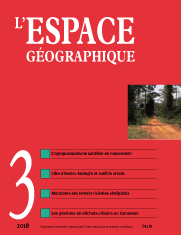

Frédéric ALEXANDRE, Catherine MERING. Socio and envionmental changes and countryside dynamics in Western Africa (1 fig.)
Stability and change of rice land areas in Basse-Casamance (Senegal) (12 fig.; 1 photo; 4 tabl.)
For several years, West Africa have undergone a degradation of agricultural landscapes. The strong climatic variability during the last decades is one of the determining factors of these transformations. The rice land area of Low Casamance, one of the significant examples of the 'agrarian civilizations' of West Africa, illustrate the current dynamics in this region. These areas concentrate numerous human activities and present strong natural and socio-economic constraints, which have an impact on rice culture systems. The analysis of the rice land areas, using an approach that combines geospatial data, landscape analysis and fieldwork data, shows contrasted dynamics between rice production and its biophysical and socioeconomic environment. The analysis reveals the shrinking size of rice land areas under the influence of global climatic changes (strong climatic variability along with salinization and acidification of water and land). The lack of workforce results in a lack of maintenance of the dikes for the protection of rice fields. The paper shows that there are strong interactions between agricultural activities, exploited ecosystems and socio-economic environment.
keywords: BASSE-CASAMANCE, DEGRADATION, RICE LAND, RURAL EXODUS, WEST AFRICA
Yao Sadaiou Sabas BARIMA, Roger ZERBO. Retrospective modelling and remote sensing analysis of deforestation in the protected Haut-Sassandra forest (Côte d’Ivoire) in a context of armed conflict (2001-2013) (5 fig.; 2 photos; 2 tabl.)
This study uses retrospective modelling in order to analyze the deforestation of the protected Haut-Sassandra Forest during the conflicts that occurred in Côte d’Ivoire from 2002 to 2011. We show how an investigation and a literature review allowed us to set up the rules of a model. Some values and some modes in the model created different hypotheses that were used to generate maps. The comparison of the maps with remote sensing data enabled us to identify the optimal parameters for the model. The results are twofold. One the one hand, a methodological result is the creation of an original tool and its validation using remote sensing. On the other hand, the study offers insight on the infiltration process.
keywords: CONFLICT, DEFORESTATION, MIGRATION, MODELING, REMOTE-SENSING
Agro-pastoralists in Sahel and social and environmental changes: New issues, new risks, new transhumance axe (12 fig.; 7 tabl.)
This paper addresses the current challenges faced by agro-pastoralism in Sahel and questions the future of these activities. It analyses the issues that these activities are currently facing in a context of climatic, social and economic changes. To provide an account of the representations and perceptions of climate change and pastoral resources among livestock farmers, a series of interviews were collected analysed using a statistical text mining approach. Based on the discourses of farmers, a renewed competition for access to natural resources in the region was highlighted, and the cartography of the new transhumance axes was mapped. The statistical analysis of the various interviews shows a significant reconfiguration of the sahelian agropastoral area.
keywords: AGRO-PASTORALISM, SAHEL, SOCIO-ENVIRONMENTAL CHANGE, TEXT MINING, TRANSHUMANCE
Informal-formal sector and urban space in Bafoussam (Cameroon): Municipal solid waste collection (2 fig.; 8 photos)
With the development of waste management systems in Sub-Saharan African cities, spaces for trading solid waste are multiplying. While several studies have addressed the formalization of the informal sector, little is known about the evolving interactions between informal and formal actors. Through an essentially qualitative approach, this paper analyses the issues of waste sorting and the relation between informal waste pickers and formal waste collectors in Bafoussam, Cameroon. The study shows how waste collectors, seeking a source of livelihood, participate in the production of urban space through an interactive process of value creation.
keywords: INFORMAL SECTOR, SOLID WASTE, URBAN SPACE, VALUE CREATION
The resilience of territories beyond metropolitan areas
Book reviews
In this issue of l’Espace géographique, you will find critical reviews of the following books
CROZET Y. (2016). Hyper-mobilité et politiques publiques. Paris: Economica, coll. «Méthodes et approches», 160 p. (Guy Baudelle, université de Rennes 2) ISBN: 978-2-7178-6862-3
L’espace géographique 2/18![]()
![]() L’espace géographique 4/18
L’espace géographique 4/18
For subscribe or buy this issue: BELIN
![]() L’Espace géographique: contents
L’Espace géographique: contents
Last modified: November 17, 2018